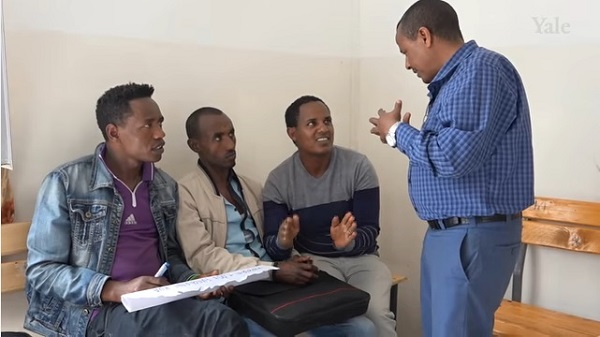
Since its inception, Primary Health Care Transformation Initiative has seen improvements in management systems at both the health center and woreda health office levels. Those successes have since led to an expansion of the program to build management capacity at the zonal and regional levels.
(YaleNews)–In 2016, a team from Yale’s Global Health Leadership Institute (GHLI) partnered with Ethiopia’s Ministry of Health to launch the Primary Health Care Transformation Initiative (PTI), which aims to improve management skills at health posts, health centers, and district health offices around the country.
Starting in 36 woredas, or administrative districts, in four regions of the country, PTI applied a mix of management education, mentorship, and health systems research to build capacity and inform health systems reform. The hope is that improved leadership and governance will lead to improved delivery of evidence-based, high-impact health services including, but not limited to, improved immunization coverage, better access to safe childbirth, and overall decreased mortality.
Since its inception, PTI has seen improvements in management systems at both the health center and woreda health office levels. Those successes have since led to an expansion of the program to build management capacity at the zonal and regional levels. This expansion will allow PTI to impact 331 districts by the end of 2019, serving a population of 47 million people.
“We are inspired by Ethiopia’s ambitious investments in primary health care and have seen measurable and meaningful changes in district management capacity,” said Erika Linnander, lecturer in public health (health policy), who’s leading the project. “The district health offices have grabbed onto new ways of working with both hands, and we look forward to similar commitment and enthusiasm at the zonal and regional levels.”
The Primary Health Care Transformation Initiative
The program was funded with a three-year, $7.5 million investment from the Bill & Melinda Gates Foundation, and was launched and continues to be led by GHLI. An additional $3.75 million in funding from the Gates Foundation will allow the program to expand and continue through 2019.
With more than 94.1 million people, Ethiopia is the second most populous country in sub-Saharan Africa. The main health issues, according to The Global Burden of Disease, are communicable infectious diseases (such as diarrheal disease and malaria) and maternal and neonatal issues (such as respiratory infections and complications of preterm birth). These issues highlight the importance of a well-managed primary health care system, notes Linnander. The government has committed to rapid expansion of a national network of health centers staffed by health officers, nurses, and midwives, and health posts staffed by health extension workers. These health facilities provide primary care services, including immunizations, pre- and post-natal care, skilled delivery, and testing and basic treatment for infectious disease.
Read the complete story at YaleNews
